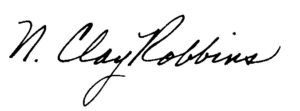They Know What to Do
Seventy years ago, J.K. Lilly Sr.’s sons, Eli and J.K. Jr., quoted in Lilly Endowment’s 1951 annual report a statement made by their late father: “My ambition is that we may enter a new and larger era of service to humanity.” The three men had founded the Endowment in 1937 to support the causes of religion, education and community development.
With individuals, families, communities and organizations across Indiana and throughout the country still reeling from the effects of the COVID-19 pandemic and with our ongoing commitment to help address racial and other societal inequities, the Endowment in 2021 found J.K. Sr.’s aspiration to be especially compelling and relevant.
One strategy the Endowment uses to pursue this aspiration is to encourage on a broad basis the creativity and abilities of a range of organizations that are engaged daily in efforts to accomplish important aims in the causes the Endowment was established to support. These organizations are committed to their missions, and they have deep knowledge about the needs of those they serve. That is why we respect and value their insights about the most pressing challenges they face and what they need to do to address them so they can enhance, expand and sustain their impact. In other words, we believe they know what they’re doing.
This report features stories about Endowment initiatives that are providing support for all of Indiana’s 38 colleges and universities and 84 theological schools in the U.S. and Canada. Each initiative provides support for the institutions to identify and prioritize their own most compelling challenges and opportunities and funding to develop and implement strategies to address them.
These varied colleges, universities and theological schools responded with creative and thoughtful strategies, which range from improving diversity, equity and inclusion on their campuses to increasing student retention rates, and from addressing recruiting challenges caused by demographic changes to taking better advantage of advances in digital technologies to deliver courses and other educational offerings. To increase the impact of these efforts, we convene grantees in each initiative so they can learn from and be encouraged by each other. During these sessions we at the Endowment gain valuable insights and perspectives that help us develop future grantmaking initiatives.

The report also features a story about the Endowment’s Enhancing Opportunity in Indianapolis initiative, through which it awarded grants to 28 organizations totaling nearly $94 million to help residents of Indianapolis break the cycle of poverty and build self-sufficient lives. The Endowment invited a wide variety of charitable organizations to propose strategies to further the initiative’s aims, with a special focus on helping Black and Hispanic/Latino residents overcome barriers to achieve lasting economic self-sufficiency. With Enhancing Opportunity grants, Eastern Star Church is helping individuals and families in nearby neighborhoods thrive. RecycleForce, an electronics-recycling business, is helping ex-offenders build new lives through employment opportunities. And through its Mosaic Center, IU Health is launching innovative workforce development programs to help employees build life-sustaining careers.
Another story in the report depicts the efforts of the Center for Leadership Development (CLD) to enhance and expand with help from the Endowment its impact on the character and leadership development and higher education success of Black youth in Indianapolis. Founded some 45 years ago by S. Henry Bundles, Jr., and other Indianapolis community leaders with Endowment support, CLD, which over the years has served more than 50,000 youth. It is committed to increasing its outreach beyond its headquarters building to sites throughout the city and enhancing counseling support and mentoring for students attending college.
The Endowment has been pleased for several years to help the Indianapolis Zoo have an outsized impact on animal conservation around the world through its Indianapolis Prize—the most prestigious conservation prize in the world—and the Global Center for Species Survival, which has recently opened at the zoo. While developing the Prize and the Center, the zoo also has continued to provide excellent opportunities and programming for visitors as one of the premier zoos in the country with an accredited botanical gardens and aquarium. More about the Prize and the Center is highlighted in the report.
And in furtherance of our founders’ interests in religion, the Endowment has expanded significantly its grantmaking to improve the public understanding of religion, which has a huge impact on the world. A story in the report describes the Religion and Cultural Institutions Initiative, through which the Endowment has approved grants totaling $43 million to 18 museums around the country to support their efforts to design exhibits on a variety of religious themes that are relevant to their collections and further their missions. The story also highlights documentaries that the Endowment has funded about the Black church in America and public radio and podcast programs we are supporting that focus on religion.
IN CLOSING, we are redoubling our efforts to further J.K. Lilly Sr.’s vision of entering “a new and larger era of service to humanity.” Knowing we cannot do that alone, we are deeply grateful that we are able to support the work of so many organizations like those featured in this report that strive day in and day out to enhance and expand their impact on those they serve. It is a privilege and blessing to know them.

N. Clay Robbins
Chairman & Chief Executive Officer
Transitions
The Endowment is pleased to note the election in 2021 of Jennett M. Hill as its president, effective February 2, 2022. Hill joined the Endowment’s board in 2015. She joined Citizens Energy Group in 2013 and served the organization as senior vice president and general counsel. Previously, Hill was a partner at the law firm of Faegre Baker Daniels (now Faegre Drinker Biddle and Reath LLC) where she practiced nonprofit and tax-exempt law. Prior to joining the firm, she worked for the former Indiana Supreme Court justice and current Indiana University Robert H. McKinney School of Law professor of practice, Frank Sullivan Jr. With her keen intellect, impeccable character and commitment to her faith, in addition to her legal expertise relating to tax-exempt organizations and significant experience serving on the boards of several private foundations and other charitable organizations, she will be a valuable addition to the Endowment’s leadership team.
It is with gratitude that we also acknowledge the contributions of esteemed colleagues who left the Endowment in 2021:
Cathy Higgins, an administrative assistant to program directors and vice presidents in education and community development, retired after nearly 30 years at the Endowment. A former high school English teacher, her gifts as a writer and her belief in the power of education were invaluable to the Endowment.
Vicki Jensen, grant coordinator and former administrative assistant in religion, retired after 30 years at the Endowment. Her high standards and meticulous attention to detail strengthened the processes that support grantmaking, and she was a tremendous resource for our grantees.
Patty Villars, a program director in education, retired after 15 years at the Endowment. Her diligent efforts advanced our grantmaking, especially regarding higher education attainment, summer youth programming and programs to help military veterans and active military personnel and their families.
Rob Smith, senior vice president for collaborative strategies, left the Endowment after three and a half years of leadership. He ably led our grantmaking for several significant causes, ranging from COVID-19 relief to the Enhancing Opportunity in Indianapolis initiative, and from our regional initiatives in Indiana to the many initiatives of the Central Indiana Corporate Partnership. We will miss his wise and insightful counsel and his collegial spirit.
Diane West, an administrative assistant, left the Endowment after three and a half years of exemplary service in community development and religion. Exceptional organizational and communication skills made her a true asset to the Endowment.